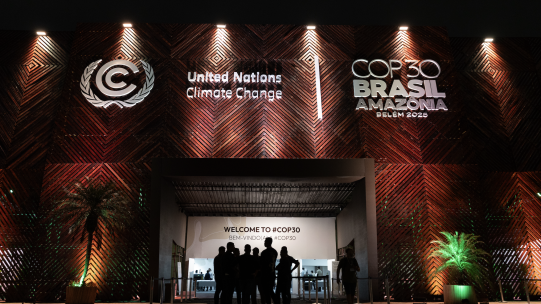How global events like COP29 and G20 impact business
Read more

The world is warming at an alarming rate, with the past decade being the hottest on record. According to the World Meteorological Organization, 2024 is set to become the hottest year yet, intensifying human and economic costs from floods, wildfires and storms.
The urgency is clear: we must act now to bridge the ever-widening climate finance gap, estimated at $4 trillion annually.
Without substantial investment, particularly from the private sector, we risk blowing past the critical limits set by the Paris Agreement, threatening global stability and livelihoods.
Read on to learn more about COP29 and G20, two global convenings happening this November, and why these global conferences have everything to do with your business.
COP29 in Azerbaijan: The role of business in climate negotiations
This year's COP29, held in Baku, is known as the "Finance COP" for its focus on mobilizing the funds needed to accelerate global climate action. With the world facing rising temperatures and increasing extreme weather events, there is a pressing need to unlock financial stability to transition to a low-carbon economy. COP29 aims to bridge the climate finance gap by setting new targets, such as the New Collective Quantified Goal (NCQG), which aspires to scale up annual climate funding to $1.8 trillion by 2030.

Businesses have a critical role to play in meeting these ambitious goals, whether it be in emerging markets where investments in sustainable projects can drive growth and resilience or by exemplifying the benefits of aligning strategies with effective and research-backed climate solutions.
The UN Global Compact is working closely with the private sector to support the alignment of business strategies with national climate commitments, ensuring that companies contribute meaningfully to global climate targets.
G20 Summit in Brazil: Leading the charge for sustainable development

Imagens aéreas locais G20 -
Local G20 aerial images - Kobra Space. Foto: Rafa Neddermeyer/Audiovisual G20
Following COP29, the G20 Summit, held this year in Brazil, is another opportunity for world leaders to align on climate action and sustainable development. G20, or the Group of 20, is the main forum for international economic cooperation. It plays an important role in defining and strengthening global architecture and governance on all major international economic issues and must play a critical role in advancing a nature-positive economy.
As the forum representing the world's largest economies, the G20 is pivotal in shaping policies that drive the global energy transition and reduce carbon emissions and driving private sector action on the SDGs.
The G20 agenda focuses on three key priorities:
- Social Inclusion and Poverty Reduction
- Sustainable Development and Energy Transition
- Reforming Global Governance

The G20 countries, responsible for 80% of global emissions, are called upon to lead the way in reducing fossil fuel subsidies, increasing investments in renewable energy and supporting the movement towards an equitable and resilient future.
For businesses, this is a chance to engage with policymakers, align with sustainable development goals and champion innovative solutions that drive both profit and positive impact.

5.11.2024 - Diálogo com participantes do G20 Social no Boulevard Olimpico
Rio de Janeiro, Brasil- 15 de Novembro de 2024- Público do G20 Social . Foto Alexandre Brum/ G20
Rio de Janeiro, Brasil- G20 Social- Rio de Janeiro, Brazil- November 15, 2024- G20 Social Summit- Public of the G20 Social forum Photo: Alexandre Brum/ G20
The benefit for businesses
Both COP29 and the G20 Leaders Summit offer platforms for companies to support global cooperation and create enabling environments.
Additionally, the Business 20 (B20), brings together a private sector task force on specific issues to make recommendations to governments and public institutions to drive ambition.
Through active participation, businesses can:
- Influence Policy: Engage with governments to shape frameworks that support sustainable growth
- Attract Investment: Position themselves as leaders in sustainability, attracting ESG-focused investments
- Drive Innovation: Collaborate on solutions that not only reduce emissions but also open new markets
As the world focuses on climate action and sustainable development, businesses have a unique opportunity to lead the way in creating a greener, more inclusive global economy.



